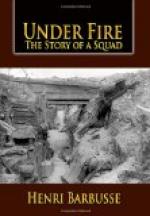“You’re not given too many exercises and fatigues.”
“And between whiles you come in here to loll about.”
The old man huddled up at the end of the seat—no other than the treasure-seeking grandfather whom we saw the day of our arrival—came nearer and lifted his finger. “When I was a young man, I was thought a lot of by women,” he asserted, shaking his head. “I have led young ladies astray!”
“Ah!” said we, heedless, our attention taken away from his senile prattle by the timely noise of a cart that was passing, laden and laboring.
“Nowadays,” the old man went on, “I only think about money.”
“Ah, oui, the treasure you’re looking for, papa.”
“That’s it,” said the old rustic, though he felt the skepticism around him. He tapped his cranium with his forefinger, which he then extended towards the house. “Take that insect there,” he said, indicating a little beast that ran along the plaster. “What does it say? It says, ‘I am the spider that spins the Virgin’s thread.’” And the archaic simpleton added, “One must never judge what people do, for one can never tell what may happen.”
“That’s true,” replied Paradis politely. “He’s funny,” said Mesnil Andre, between his teeth, while he sought the mirror in his pocket to look at the facial benefit of fine weather. “He’s crazy,” murmured Barque in his ecstasy.
“I leave you,” said the old man, yielding in annoyance.
He got up to go and look for his treasure again, entered the house that supported our backs, and left the door open, where beside the huge fireplace in the room we saw a little girl, so seriously playing with a doll that Blaire fell considering, and said, “She’s right.”
The games of children are a momentous preoccupation. Only the grown-ups play.
After we have watched the animals and the strollers go by, we watch the time go by, we watch everything.
We are seeing the life of things, we are present with Nature, blended with climates, mingled even with the sky, colored by the seasons. We have attached ourselves to this corner of the land where chance has held us back from our endless wanderings in longer and deeper peace than elsewhere; and this closer intercourse makes us sensible of all its traits and habits. September—the morrow of August and eve of October, most affecting of months—is already sprinkling the fine days with subtle warnings. Already one knows the meaning of the dead leaves that flit about the flat stones like a flock of sparrows.
In truth we have got used to each other’s company, we and this place. So often transplanted, we are taking root here, and we no longer actually think of going away, even when we talk about it.
“The 11th Division jolly well stayed a month and a half resting,” says Blaire.
“And the 375th, too, nine weeks!” replies Barque, in a tone of challenge.
“I think we shall stay here at least as long—at least, I say.”




